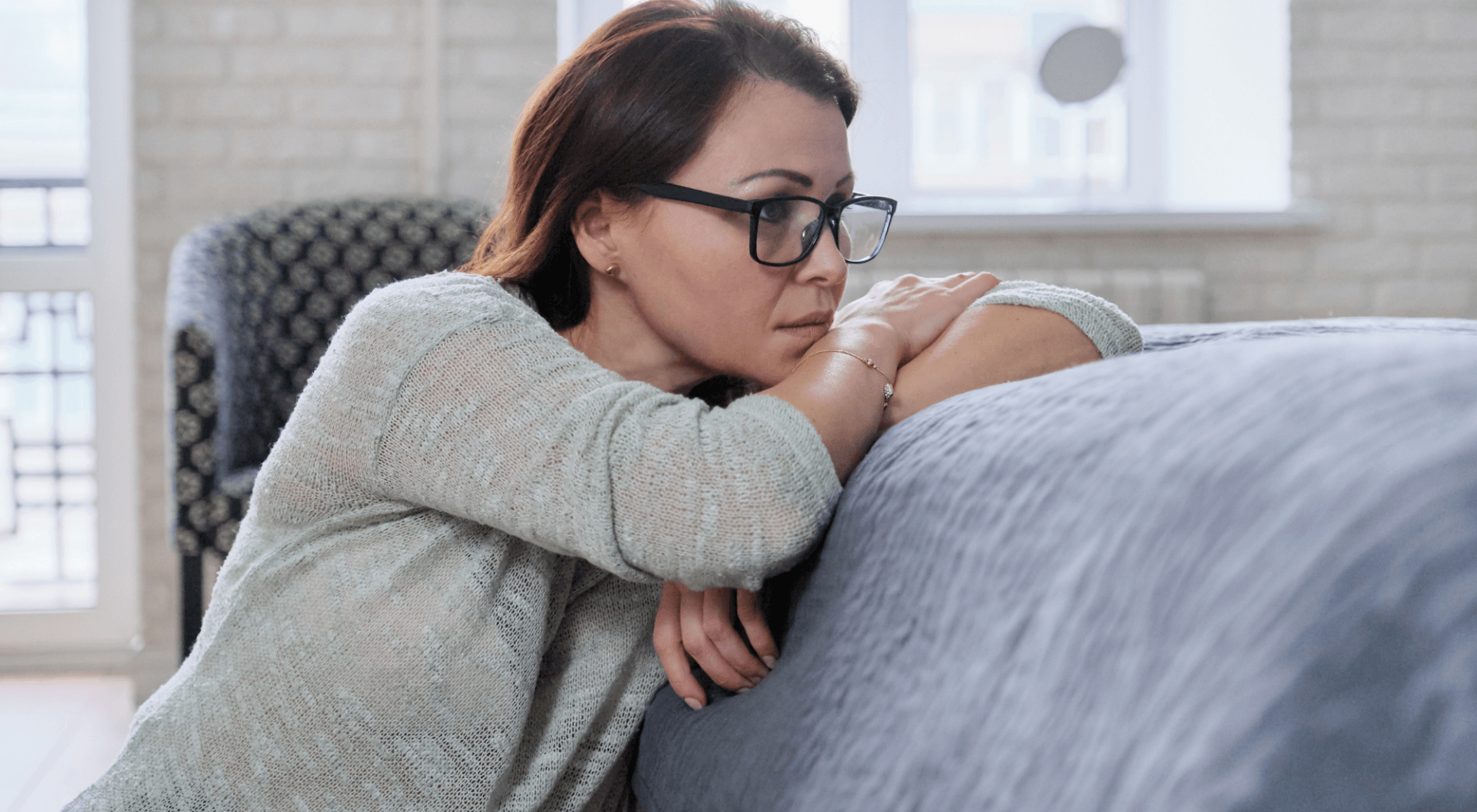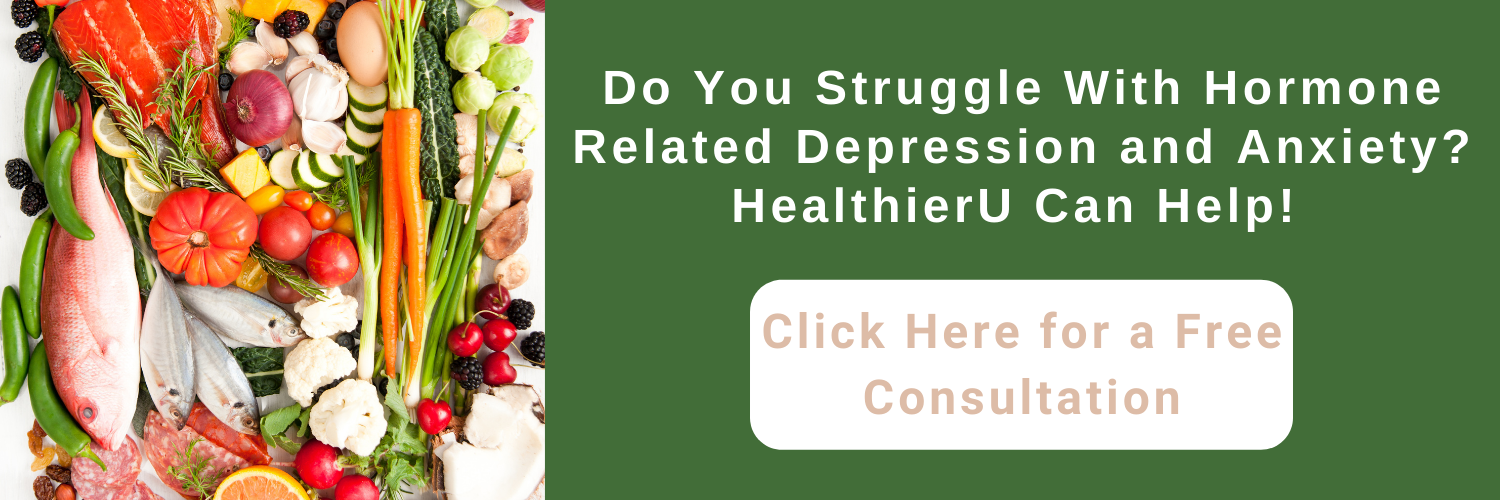Can Hormone Imbalance Cause Depression and Anxiety? An In-Depth Look at the Symptoms and Treatments
"The content below is not intended to be a substitute for professional medical advice, diagnosis, or treatment. Always seek the advice of your physician or other qualified health provider with any questions you may have regarding a medical condition."
You're normally pretty calm, cool, and collected.
But lately, it feels like you're stuck on loop after loop of an endless roller coaster of anxiety and depression.
You cry at the drop of a hat, are unexplainably moody, and don't feel like doing any of the things that used to sound like so much fun.
You've done a little research and are wondering if your symptoms might be due to a hormone imbalance.
You've come to the right place.
Here we delve into the symptoms and causes of depression and anxiety due to hormonal imbalance, and where you can go to find treatment.
Table of Contents
What Is Hormone Imbalance?
A hormonal imbalance occurs when you have too much or too little of a specific hormone in your bloodstream.
Since hormones play such a huge role in your body, even a minor fluctuation can cause side effects system-wide.
But can hormone imbalance cause depression and anxiety? Let’s examine the facts.
Can Hormone Imbalance Cause Depression?
Yes. Depression caused by hormonal imbalance is not unusual, particularly among women.
HealthierU has helped many people conquer anxiety and depression through their:
- Nutritional Response Testing
- Diet and nutritional guidance; and
- Herbal and supplement instruction
Dr. Sergi has over 25 years of experience and is there to walk alongside you each step of the way with education, encouragement, and evaluation.
Let’s take a look at the symptoms and the types of hormone imbalances that may result in depression.
What Are the Symptoms of Hormone Related Depression?
Depression caused by hormonal imbalance can manifest in a wide variety of ways, including:
- A lack of interest in pleasurable activities
- Sadness
- Excessive crying
- Hopelessness
- Mood swings
- Excessive hunger
- Loss of appetite
- Weight gain or weight loss
- Ruminating thoughts
- Apathy
- Difficulty focusing are concentrating
- Sleepiness
- Irritability
- Anger
- Sleep issues
- Lack of energy
- Isolation
- Difficulty in thinking clearly
- Poor decision-making skills
- Decreased performance at school or work
- Guilt
- Pain, such as muscle aches or headaches
- Drug or alcohol abuse; and
- Suicidal thoughts or tendencies
In extreme cases, depressed individuals may also demonstrate:
- Signs of mania
- Changes in their motor skills; or
- Psychotic episodes
What Hormone Imbalances Cause Depression?
Childbirth
Most new moms experience postpartum “baby blues” after giving birth, which can include:
- Excessive crying
- Anxiety
- Mood swings; and
- Difficulty sleeping
But if these symptoms continue past the first two weeks following the baby's birth, you may be experiencing postpartum depression.
Postpartum depression is one of the most common forms of hormone-induced depression and can result in severe, long-lasting effects.
Postpartum depression is caused by the dramatic drop in estrogen and progesterone — and surge in oxytocin and prolactin — in the days following delivery.
It’s important to know that postpartum depression is not a weakness or character flaw. Rather, it’s simply the reaction of your body to giving birth.
If a woman is experiencing postpartum depression, immediate treatment can help manage the symptoms — and help the mother bond with her baby.
If postpartum depression is left untreated, it may last for months and interfere with the mother's ability to care for her baby and accomplish other daily tasks.
The signs and symptoms of postpartum depression may include:
- Severe mood swings
- Depressed mood
- Difficulty bonding with the baby
- Feelings of hopelessness
- Excessive crying
- Withdrawal from friends and family
- Extreme anxiety
- Panic attacks
- Loss of appetite
- Eating much more than usual
- Insomnia
- Sleeping too much
- Overwhelming fatigue
- Loss of energy
- Decreased interest and pleasure in activities that used to be enjoyable
- Intense irritability
- Anger
- Fear that you're not a good mother
- Feelings of inadequacy, worthlessness, shame, or guilt
- Inability to think clearly, or make decisions
- Restlessness
- Thoughts of harming yourself or your baby; and
- Thoughts of death or suicide
Menopause
If you are a woman in menopause, you are probably well acquainted with the “menopause blues” as you find yourself feeling more ...
- Sad
- Melancholy; or
- Irritable
… than normal.
Some women, however, experience a much more noticeable depression that can negatively affect their daily lives and their ability to function and get through the day.
The symptoms of depression often manifest themselves in women who are making the transition to menopause, as well as those who are officially menopausal.
Throughout life, a woman's body produces estrogen to:
- Begin menstruation and support physical development
- Regulate the sex drive
- Facilitate the growth of the lining of the uterus during pregnancy; and
- Regulate weight and metabolism
When menopause hits, the estrogen production dramatically drops and can lead to a variety of symptoms, one of which is depression.
This decrease in estrogen is similar to what a woman experiences:
- Right before her period
- During and immediately following pregnancy; and
- Throughout perimenopause (the beginning stages of menopause)
Many women turn to hormone replacement therapy to balance their hormones during and after menopause.
At HealthierU, we believe there's a better way to balance hormones and relieve depression caused by menopause.
Our nutrition response testing can help identify any deficits and help you get your life back.
Thyroid Imbalances
Studies have confirmed the link between thyroid function and depression.
People with thyroid conditions are much more likely to experience depression — and vice versa.
The symptoms of hypothyroidism have a lot in common with clinical depression, and include:
- Fatigue
- Bloating
- Weight gain
- Memory loss; and
- Difficulty processing information
Get in touch with HealthierU today to determine if a thyroid imbalance is the cause of your depression.
Can Hormone Imbalance Cause Anxiety?
Hormone imbalance can also cause anxiety.
Next, we’ll examine the symptoms and the specific hormonal imbalances that can lead to anxiety.
What Are the Symptoms of Hormone Related Anxiety?
The symptoms of hormone-related anxiety are varied, and may include:
- Sweating
- Hyperventilating
- A sense of impending danger or doom
- Nervousness
- Excessive worrying
- Irritability
- Racing thoughts
- Insomnia
- Nausea
- Heart palpitations
- Trembling
- Restlessness
- Increased heart rate
- Weakness
- Fatigue; and
- Difficulty concentrating
What Hormonal Imbalances Cause Anxiety?
Anxiety may be the result of an imbalance in one or more of the following hormones:
- Estrogen
- Testosterone
- Cortisol
- Adrenaline
- Thyroid Stimulating Hormone (TSH)
- Triiodothyronine (T3)
- Thyroxine (T4); or
- Oxytocin
Estrogen and Testosterone Imbalances
Fluctuations in the levels of sex hormones, such as estrogen and testosterone, can play a role in the amount of anxiety you experience.
When these hormone levels change, your mood can be affected.
This is why people sometimes experience anxiety during hormonal changes like:
- Puberty
- Menstruation
- Pregnancy; and
- Menopause
For example, during the last 2 weeks of their menstrual cycles women experience a drop in estrogen — and occasionally serotonin, which is the “happiness hormone.” This fluctuation is often accompanied by an increase in anxiety.
Low testosterone can also lead to an increase in anxiety in both men and women. Since women naturally have lower levels of testosterone than men,
women are more prone to anxiety.
Cortisol and Adrenaline Imbalances
Cortisol and adrenaline are known as the “stress hormones,” and are released any time you feel threatened or in danger. They bring about your fight-or-flight response to help your body cope with the threat and get prepared, just in case you need to take action.
But what happens if your body kicks into fight-or-flight, but you’re not actually in danger? Excess levels of adrenaline and cortisol can leave your body feeling anxious.
And this increased release of stress hormones can cause your body to produce even more stress hormones in response — which can leave you feeling stressed and anxious.
Thyroid Imbalances
An imbalance in thyroid hormones can also bring about feelings of anxiety.
Hypothyroidism (underactive thyroid) may result in …
- A decrease in memory
- Poor concentration; and
- Difficulty in performing normal activities
… all of which can lead to anxiety.
The symptoms of hyperthyroidism (overactive thyroid) often include the symptoms of anxiety, such as:
- Insomnia
- Elevated heart rate
- High blood pressure
- Restlessness
- Mood swings; and
- Irritability
In addition, a
2020 study suggests that thyroid inflammation may play a significant role in the development of anxiety disorders.
Oxytocin Imbalances
Some hormones have a positive impact on anxiety and may help reduce it, like oxytocin, aka the “love hormone.”
Your brain emits oxytocin when you are ...
- Hugging
- Cuddling; and
- Having sex
… as well as when a mother breastfeeds her child.
The release of oxytocin can produce anti-stress-like effects, such as:
- Reduced reduction of blood pressure
- Lower cortisol levels
- Increased pain threshold; and
- The promotion of growth and healing
If you are …
- Dealing with stress
- Using opioid drugs; or
- Experiencing fear or anger
… you may experience a decrease in oxytocin and an increase in the symptoms of anxiety.
Treatments for Hormone Related Depression and Anxiety
Homeopathic Remedies
Homeopathic remedies that have proven helpful in managing depression and anxiety include:
- Arsenicum album
- Ignatia
- Natrum muriaticum
- Aconite
- Argentum nitricum
- Lycopodium
- Silica; and
- Stramonium
Prescription Medications
If you are taking prescription medications for anxiety or depression, it's important to stay in close contact with your physician.
Prescription medications that have proven helpful in managing depression and anxiety include:
- Selective serotonin reuptake inhibitors (SSRIs), such as:
- Celexa
- Lexapro
- Prozac
- Luvox
- Paxil; and
- Zoloft
- Selective serotonin & norepinephrine inhibitors (SNRIs), such as:
- Khedezla
- Pristiq
- Cymbalta
- Fetzima; and
- Effexor
- Trintellix
- Viibryd
- Remeron
- Elavil
- Tofranil
- Pamelor
- Sinequan
- Wellbutrin
- Monoamine oxidase inhibitors (MAOIs), such as:
- Marplan
- Nardil
- EMSAM; and
- Parnate
- Spravato; and
- Deplin
Lifestyle Adjustments
Changes in your daily life such as ...
- Getting more sleep
- Increased exercise; and
- Eating a healthy diet
… can all help regulate hormone imbalances and help lessen symptoms of anxiety and depression.
Improved Stress Management
The following methods of stress management have also proven helpful in regulating hormone imbalances that lead to anxiety and depression:
- Regular exercise
- Having realistic goals and expectations
- Positive self-talk
- Deep breathing exercises
- Meditation
- Mindfulness meditation
- Progressive muscle relaxation
- Mental imagery relaxation
- Relaxation to music
- Biofeedback; and
- Counseling
Are You Suffering From Hormone Related Depression and Anxiety? HealthierU Can Help
If you are suffering from anxiety or depression, HealthierU can help.
Through Nutrition Response Testing, Dr. Sergi can help to pinpoint exactly what is causing the problem, and then formulate a plan to address the issue naturally, without the use of traditional medications.
Nutrition Response Testing examines your body to determine the underlying causes of your symptoms.
After the Nutritional Response Testing assessment, Dr. Sergi creates an individualized plan that includes:
- Lifestyle guidance
- Nutritional support; and
- Supplementation
The goal is to permanently correct your health issues, including anxiety and depression.
Contact Dr. Sergi today for your complimentary consultation.






